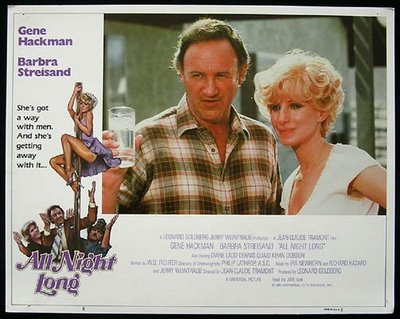
ALL NIGHT LONG
US, 1981, 88 minutes, Colour.
Barbra Streisand, Gene Hackman, Dennis Quaid, Dianne Ladd.
Directed by Jean- Claude Tramont.
All Night Long is a brief and fairly brisk domestic comedy. It focuses on the rat-race and middle-age crisis. The hero, George Duppler, is played well be Gene Hackman. He is the man who has come to the highest rung on his particular ladder and has been relegated to several rungs lower. He eventually rebels. His marriage breaks up; he becomes involved with a married woman; he opts for an alternate lifestyle.
The material is not particularly original but the principals do their best with it and bring it humorously to audience attention. Barbra Streisand, probably miscast, does very good work as the sexy suburban housewife for whom things get out of hand. There is a very good supporting cast. Some visual and verbal humour enhances the material which is not particularly deep but at least offers a challenge to its middle class audience. Direction is by a Frenchman, Jean- Claude Tramont - perhaps a Gallic view of Los Angeles. There is a humorous parody of Apocalypse Now! in a supermarket and Barbra Streisand does an imitation of a country and western singer.
1. The appeal of this contemporary comedy? The familiarity of the types and situations? Suburbia? Particularly American? The middle class English-speaking world? Middle-age crisis? A comedy of morals and manners?
2. The significance of the title and the discussion about the night in the city being the new frontier and the need to survive all the difficulties? The use of night for realistic purposes, as a symbol? Dawn, waking up etc.?
3. The world of California, business, the suburbs, homes, shops, the world of affluence, opting out, creative inventiveness and art?
4. Colour photography of Los Angeles city and suburbs? Contemporary style? Musical score, themes? Barbra Streisand's parody of country and western? The familiar songs and their use throughout the film? A Frenchman's view of the United States?
5. The focus on George Duppler? The initial hearing of him talk, argue, the glass building and the chair smashing the windows? The attack on middle class competitiveness and affluence? George going berserk, hospital, his wife's reaction? Introduction to a man in middle-age crisis? The end of his career? The break-up of his marriage? The relationship with his son? His possibilities for a new way of life? The upwardly mobile executive moving to supermarket night manager? His being relegated to the new frontier of the night? His relationship with his staff and the various types, especially the young guard? The humorous introduction to Freddie?
6. George's relationship with Helen? Their typical suburban way of life? The funeral situation and behaviour? Superficial relationships? Their reaction to his being dismissed? Helen and her expectations? Freddie and his slob behaviour? Helen's feeling of betrayal and ousting George? His leaving home, setting up in a motel? Helen's reaction and summoning the lawyer, the meeting? Her change after George moved out and liaison with the lawyer and George's catching them?
7. Freddie as a slob, supermarket, work, meals? Painting Cheryl's room? The affair? Cheryl's approach to George and his being in the house? Freddie finding out? The clash? Freddie ousting his father? His later understanding his father? Their working together?
8. Life at the supermarket at night? The types, the complaints, the oddballs? The young guard and his violent shooting and George's saving the day? His office? The big lady robber and the techniques for subduing her? Cheryl and her seeking out George. visits, watching the woman be subdued? Her visiting George in his motel? Inviting him home? Freddie’s finding his father there? The beginnings of the affair? What did each want from it?
9. George talking with Cheryl and explaining his life and assessing it? Her comments and urging him to break out? His interests? Inventions? The possibility of a future? His taking Cheryl literally? His turning up during the daytime and her embarrassment? The discussions with Bobby at the funeral meal. at the garden ? and spoiling his work? George's renting the floor of the factory and starting a new life? The humour of his quitting the supermarket ? and the attack on the executives? The irony of his visit to his boss in order to be reinstated and his rejection? The parody of Apocalypse Now! with the helicopter attack in the supermarket? The visit to Cheryl and inviting her to share his new way of life?
10. The anniversary party, the glib relationships? The absentminded elders? Helen and her embarrassment? Bobby and his not realising the truth, Cheryl's reaction to him and the incident with the cake? Bobby and his rejecting Cheryl? His playing war games - especially with the men at the fire station?
11. Barbra Streisand portrait of Cheryl? hair, her colour? As wife? Having affairs? Her kookiness, and her not realising the consequences? Her organ and singing country and western? Her gradual self-assertion? Moving in with George? unable to handle the situation and leaving the message on tape? George's pursuing her to the fire station and asking her to slide down? Her leaving Bobby and starting a new life with George?
12. The basic message for the middle class audience, reassessment of lifestyle, career, relationships? Humorous insight into family, marriage, relationships, age, crises, career, money, ambitions, opportunities? Manners and morals in contemporary America? Insight through comedy?